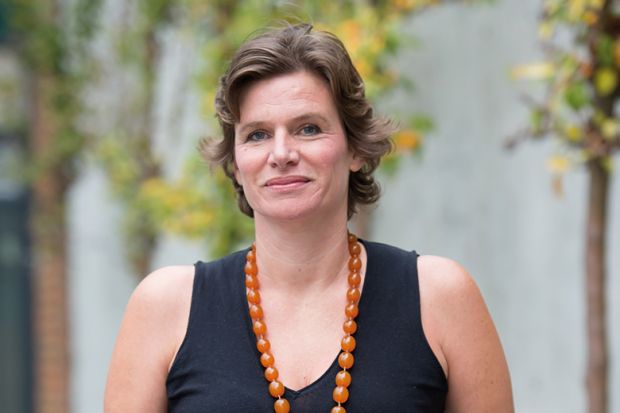Mariana Mazzucato is an American-Italian economist. She holds the RM Phillips chair in the economics of innovation at the University of Sussex, as well as having previously worked at the University of Denver, Bocconi University and The Open University. Her book The Entrepreneurial State: Debunking Public vs. Private Sector Myths was featured on the 2013 Books of the Year list by the Financial Times. She is joining University College London to establish a new institute within the Bartlett Faculty of the Built Environment: the Institute for Innovation and Public Purpose.
Where and when were you born?
I was born in Rome in 1968 but moved to the US with my family when I was four.
How has this shaped you?
In Italy, I don’t feel Italian. In the US, I don’t feel American. In England, I don’t feel British. I feel very international, and in London I feel very much at home. But this is also why fearmongering debates about “walls” in the US or the UK totally depress me.
What do you hope to achieve with the Institute for Innovation and Public Purpose?
The goal of the IIPP, which I am founding and directing at UCL, is to rethink the role of the public sector, and especially the notion of public value, in an era in which the role of the state has been seen at best as a fixer of problems, not as a key agent in co-creating a new type of economy. UCL is a perfect place for this venture, with its truly radical history and its current focus on “grand challenges” and disruptive impact.
What are the greatest misconceptions surrounding innovation policy?
That innovation happens when the state gets out of the way. As I showed in The Entrepreneurial State, exactly the opposite is true. Many game-changing breakthroughs – the internet, biotechnology, nanotechnology and today’s emerging green technology – are the result of risk-taking, bold, entrepreneurial action by public sector institutions. But storytellers rule the world, and the idea of the lone, garage tinkerer triumphing against the odds is a great story. Steve Jobs coming up with the iPhone is a great story. But it’s only half true. Almost all the technological developments that made the iPhone possible were the result of state investments right along the innovation chain.
You argue that government is a market shaper: what do you mean by this?
Orthodox economics imagines a very limited role for the state in the economy – to fix market failures in areas where there is a clearly defined “public good”. But this model doesn’t do a very good job of describing how many public agencies have acted in the past, or of providing a policy framework for governments to apply the right lessons from Silicon Valley. From Darpa [the Defense Advanced Research Projects Agency] and SBIR [the Small Business Innovation Research programme] in the US to [the venture capital fund] Yozma in Israel, and Sitra [the Finnish Innovation Fund] and Tekes [the Finnish Funding Agency for Innovation] in Finland, public agencies have actively shaped and created new markets. And arguably China is doing the same now with investments in new green technologies…instead of seeing policy as “intervening” in the market, we should see it as co-creating it. This also means that we need to be more vigilant about what is being created, and here civil society has a key role.
To what extent is solving global challenges a driver of innovation?
You might argue not enough, but I want to change that. Much so-called innovation, for example in the pharmaceutical sector, is focused on profit-driven, minor variations on existing drugs that can be patented. This is a result of an innovation system with the wrong incentives. We need mission-oriented innovation policies that address the new global challenges of the 21st century, such as climate change and ageing populations.
What was your dream career as a child?
To be a documentary film-maker.
What kind of undergraduate were you?
I studied international relations and history at Tufts University in Boston, and spent a lot of time doing sports, especially rowing very early in the morning on the Charles River. I also interned at a law firm…thinking back on that time, I have no idea when I had time to study.
What has changed most in higher education in the past five to 10 years?
The ability to nurture critical thinking, and to value social sciences as much as natural sciences. Evaluation mechanisms such as the UK’s research excellence framework need to be sure that they are fostering, not limiting, the ability for out-of-the-box thinking and new types of conversations between departments – real interdisciplinarity.
How could the UK higher education landscape be reshaped by the expansion of private universities?
I think that we need to be careful in the way that many public goods, from universal education to healthcare, are increasingly being privatised. One of the key sources of inequality in the UK is the dichotomous private and public education, especially at the secondary school level. I think the real task is to make sure that we continue to properly fund a cutting-edge public university system that gives access to as many bright students as possible.
If you were the higher education minister for a day, what policy would you immediately introduce to the sector?
I’d make all research open access. Publicly funded research should be publicly available.
Which fictional character do you identify with most?
Pippi Longstocking.
What would you like to be remembered for?
Helping to rethink the role of the public sector in the kinds of dynamic partnerships that we need today, to create a more innovative, inclusive and sustainable economy. But perhaps even more: as someone who really cared and put herself out on the line in the process.
Appointments
Karen Holford has been appointed Cardiff University’s new deputy vice-chancellor. In 1990, after a career in the automotive industry, she joined Cardiff’s School of Engineering, where she has served as director for five years. Professor Holford has worked to support women in science and engineering and to promote industry-relevant learning at Cardiff. In 2016, she was named in The Daily Telegraph’s Top 50 Women in Engineering list. Professor Holford said that she was “delighted” to take on a senior role at “an ambitious and innovative university with so much to be proud of”.
Eleanor Riley has been appointed to lead the Roslin Institute at the University of Edinburgh. She joined the university for the first time in 1990 after a period working for the Medical Research Council in Gambia. She became professor of infectious disease immunology at the London School of Hygiene and Tropical Medicine, University of London in 1998 and, from 2001 to 2013, led its department of immunology and infection. She is currently professor of infectious disease immunology at LSHTM. Professor Riley said that she looked forward to “guiding the institute to continued success and to strengthening research collaborations at home and abroad”.
Alastair Goldman, head of the University of Sheffield’s department of molecular biology and biotechnology, has been appointed dean of the Faculty of Life Sciences at the University of Bradford.
Mohammed Dastbaz will take up the role of deputy vice-chancellor of the University of Suffolk. He moves on from his position as pro vice-chancellor and dean of the Faculty of Arts, Environment and Technology at Leeds Beckett University.
York St John University has announced the appointments of Bob Gammie as dean of York Business School, Rebekka Kill as head of art, design and computer science, and Mark Edwards as head of psychological and social sciences.
POSTSCRIPT:
Print headline: HE & me
Register to continue
Why register?
- Registration is free and only takes a moment
- Once registered, you can read 3 articles a month
- Sign up for our newsletter
Subscribe
Or subscribe for unlimited access to:
- Unlimited access to news, views, insights & reviews
- Digital editions
- Digital access to THE’s university and college rankings analysis
Already registered or a current subscriber?









